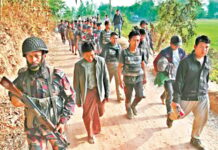Mohiuddin Alamgir and Sarder Mahabbat Ali
The popular protests spearheaded by youths from Shahbagh Square on the fifth day on Saturday saw huge torch and candlelight processions after dusk as people from all walks of life continued streaming into the heart of the city all day taking a fresh vow not to leave the square until all war criminals, including Jamaat-e-Islami leader Abdul Quader Molla, were handed death sentence.
The spontaneous protests, continued ceaselessly since Tuesday afternoon after an International Crimes Tribunal sentenced Quader Molla life term imprisonment for the war crimes he had committed in 1971.
Like the previous four days, the Shahbagh Square and its surroundings remained vibrant all day on Saturday with visitors expressing solidarity, protesters chanting frequent slogans and artistes rendering patriotic songs.
Popular slogans like ‘Fanshi, Fanshi, Fanshi Chai – Quader Mollar Fanshi Chai’ (hang Quader Molla), ‘Ka tey Quader Molla, Tui Razakar, (Ka for Quader Molla, you are collaborator)’ ‘Ga tey Ghulam Azam, Tui Razakar’ (Ga for Ghulam Azam, you are collaborator)’ chanted by the protesters in chorus resounded through the square and beyond.
Slogans like Janaganer Dabi, Quader Mollar Fansi (people want death penalty for Quader Molla), Jamaat-e-Islam made in Pakistan, ‘Tomar Amar Thikana, Padma-Meghna-Jamuna’, (Our address is Padma, Meghna and Jamuna), ‘Tumi key, Ami key, Bangalee, Bangalee’ ‘Joy Bangla’ were also chanted by the protesters.
Apaser Rai Mani Na, Manbo Na (We will not accept the verdict of compromise), Apaser Parinam Bangla Habey Pakistan (Such a compromise will turn Bangladesh into Pakistan) and others filled the air at Shahbagh and its surroundings.
The mass protests at Shahbagh Square, christened Prajanma Square by the protesters, electrified the whole country with a sense of patriotism triggering similar rallies in almost all cities and towns.
In the capital blogger Imran H Sarker said people across the country had rejected the verdict of the International Crimes Tribunal2 with ‘resentment and hate’.
The protesters sported national flag, marched in small processions carrying banners and festoons, screened films on the independence war, painted the road stretches, took part in protest painting, staged street plays and sang patriotic songs.
Agriculture minister Matia Chowdhury, prime minister’s foreign affairs adviser Gowher Rizvi, educationist Anisuzzaman, and National Football Team players, cricketer Shahriar Nafees visited the rally and expressed their solidarity with protesters.
People from the neighbouring districts of Naryanganj, Munshiganj, Gazipur and Comilla and also far away districts like Barisal also joined the protests in Dhaka.
Bipul Mistri said he came all the way from Barisal to express his disappointment with the Quader Molla verdict. He added that he was participation in the protests in Barisal and would carry the spirit of Shahbagh there.
The protesters warned that those who would try to compromise with the anti-liberation forces would be rejected as ‘neo-Razakars’.
A giant-size national flag was spread overhead on the road stretch in front of Dhaka University Fine Arts Faculty. Several thousand protesters marched down the roan carrying burning candles and torches after dusk.
Young people, who for the first time joined a rally on the day, also raised their voice for death penalty to war criminals.
Members of Udichi Shilpi Gosthi and Sangskritik Union activists along with others sang patriotic songs to cheer up the protesters.
Fine arts students put on display caricatures of war crimes suspects along the road stretch from the fine arts faculty to the Shahbagh Square.
They also arranged a protest painting programme in front of their faculty. Many youths also wrote their demands on the streets. Some also wrote their demands on the streets with flower petals.
Many were seen walking around with colours and brushes, drawing the national flag and writing slogans on the cheeks of the protesters.
Music, including a song composed by noted singer Kabir Sumon and dedicated to the Shahbagh Square protesters, was also played on PA system.
The protestors also covered several giant-size hoardings, including those of Fair and Lovely and Grameenphone, at Shahbgah crossing with their demands.
Many people queued up to sign on long white cloth to express their support to the movement.
The Dhaka University Film Society showed several films on the war of independence on a big screen the organisation set up at the venue.
Cultural organisation Tirandaj staged street plays.
Many city dwellers came with their children to attend the rally on Saturday, a weekly holiday.
At least three organisations ran first aid centres at the venue.
The Dhaka WASA provided drinking water for the demonstrators, while the Dhaka City Corporation came with mobile toilets.
The police, meanwhile, blocked road stretches to Shahbagh from Kantaban, Matsya Bhaban and the Ruposhi Bangla Hotel.
Shahbagh police inspector Serajul Islam said that the protests were peaceful and they had blocked the road to ensure security.
Some of the protesters who opened a page on the social networking site Facebook on the movement said that many young people in outlying districts had started for Dhaka to join the protests.
Protesters said similar protests had also been reported from different countries, including Saudi Arabia, the United States and the United Kingdom, by the expatriate Bangladeshis.
Protesters on Friday called for a national unity of political parties, professionals, cultural, students and youth organisations in demand of death penalty for the war criminals of 1971.
They also demanded a ban on Jamaat and cancellation of the citizenship of Jamaat leaders and took oath by raising their hands that they would boycott all social, financial and cultural outfits and media outlets linked to Jamaat.
Source: New Age









